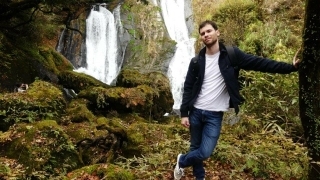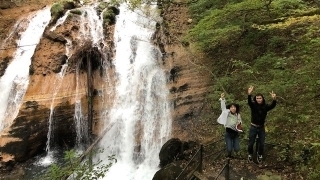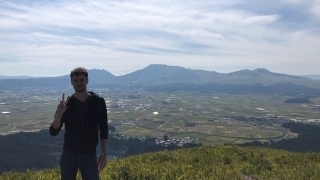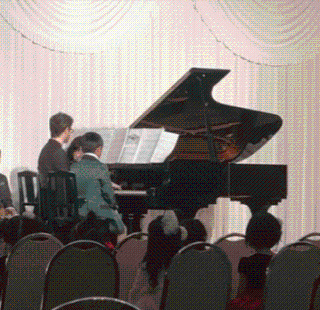JET Programme Series: Overcoming Culture Shock through Music - Paul Hadden



JET Programme Series: Overcoming Culture Shock through Music - Paul Hadden

My whirlwind JET experience in Oita
My name is Paul Hadden, I am thirty-three years old, and this is actually my second time in Japan on the JET Programme. The first time that I did JET was in 2011, where I was placed in the heart of Osaka City for three years - years which I consider to be some of the best of my life. Because this is my second time on the programme, I had a pretty good idea of what I should expect in terms of the job and my life here in Japan. I thought I would come here and that things would just instantly fall into place. What I never expected to happen, however, was to find myself deep in the throes of stage two culture shock just a few months into my experience. I can honestly say that the first time I was here I never experienced any real culture shock, not once, during my three years in Osaka, and was convinced that I had dodged a bullet. But strangely, this is exactly what happened to me here in Oita. Perhaps it was my age? I was seven years younger last time that I ventured to Japan, after all. Perhaps it was the fact that I was no longer in a foreigner bubble, and had to force myself to use Japanese on a daily basis and navigate things by myself? It is impossible to really know what triggered the shock, but regardless of the cause I was certain that I had it. Somewhere at the end of August and the beginning of September I found myself spending my days in an anxious, disoriented fog and was sick with a longing to return home. Despite my previous experiences here and the fact that I had some Japanese under my belt, I was confused by everything and didn't know how to proceed socially, or at work. I was culture shocked.
That I found myself suffering from culture shock says very little about where I was placed. It was not Japan's fault, it was not Oita's fault, and it was certainly not the fault of the many wonderful Japanese people whom I have met since moving here. Culture shock, as I have come to learn, is a normal and often unavoidable part of moving abroad.
I have always believed that it's not so important what happens to us, as to how we deal with it, and I always knew at the back of my mind that culture shock was something that I might one day experience. So with the help of some good friends, some drastic lifestyle changes, and a whole lot of research, I came to understand that what I was going through was completely normal, and would eventually pass – especially if I continued to study the language and culture, and to try to integrate into the local community. However, the thing that truly saved me from the disorientation of culture shock, and that helped me to settle into, and begin to enjoy my new life here in Oita, was music. I have been playing piano off and on for the last sixteen years, and the decision to take up piano practice here in Japan was what truly helped me to find my way here in Oita and feel like part of the community.
After hearing that I was interested in taking piano lessons, one of the English teachers at the school very nicely arranged for me to have a trial lesson with a nearby piano teacher whom she had found after a quick internet search. Thus, I came into contact with Miyasako sensei, my current piano teacher, and one of the kindest and most patient people that I have ever met. I have been practicing piano with Miyasako sensei once a week since September, and despite that language barrier (she is very, very patient with my broken Japanese!) I have been able to learn three wonderful pieces by different Japanese composers. I have even come to learn that Oita is home to one of Japan's most celebrated composers – Taki Rentaro, and have been enjoying discovering his powerful and haunting music. Miyasako sensei has been teaching piano for over three decades now, and admitted to me that she was very surprised when I walked in her door as she had never had a foreign piano student before! Yet, she accepted me right away and now I feel honored to be a part of her community of piano students. The highlight of my piano lessons so far has been performing alongside her forty other piano students (mostly much younger than me!) at her annual Christmas recital. I feel so blessed to find myself having this wonderful opportunity to experience music education in a completely different cultural setting. I continue to be blown away by the dedication of the Japanese students, and felt myself covered in goosebumps during many of the piano performances by students who were about two decades younger than me!
I have also found myself more involved in the school than ever. The music teacher, on hearing that I play piano, even invited me to perform a fast paced piece of music with the school's Brass Band during their annual bunkasai cultural festival. We played a electric, jazzy piece called 'Lupin III' from an anime of the same name. The performance was a massive success, and helped me to form a strong connection with the students in the band. I had never played with other musicians before and the feeling that I got from being able to harmonize with them on stage is indescribable. All of the barriers of age, culture, and language seemed to wash away in the universal language of music. This is what JET is all about, I thought: forming connections with the teachers and students, not just by teaching them English, but by becoming involved in the community. JET was not just about teaching my own culture and showing the ways that we are different, but about finding those things that we have in common.
The possibility of culture shock should not scare you away from the wonderful life changing experience of JET. The JET Programme is not some sort of fantastical escape from reality. Like every other job, you will be faced with challenges, be forced to deal with interpersonal conflict, and have to cope with stress. And unlike most jobs, with JET you are also dealing with the challenge of having to operate in a completely different culture. I never thought I would experience culture shock. But I suppose that it was just my arrogance that made me feel immune to something so normal and unavoidable. I envisioned myself slipping easily in to my new life here in Japan without having to rely on anyone else. But the truth is that I could have never defeated my culture shock if it weren't for other people.
Thanks to Miyasako sensei, the brass band teachers and students, and the support of friends, both old and new, I was able to break through the fog of culture shock and being seeing Oita for what it really is – a gorgeous prefecture with a fascinating history. Now that I am no longer suffering from intense culture shock, and am more adjusted to life here, I find that I can better appreciate the soaring natural beauty of the place, as well as make connections with more and more of the people here. I have since been invited by some of the teachers to explore the stunning area surrounding Mt. Aso volcano, as well as discover several natural springs, waterfalls, hot springs, and rivers. The highlight of these excursions so far has definitely been being taken to witness the 'unkai' or 'sea of clouds' by Mt. Aso - a natural phenomenon whereby clouds spread out below you like an ocean, causing the surrounding mountains to look like green islands floating in a white sea. I also made a batch of homemade doubles for the teachers at one of my school – thanks to some instant bara mix – and they were a hit!
Here on JET, I am learning a lot about Japan, but I am also learning a lot about myself, and about what truly matters in this life. The most important thing that I have come to realize is that at the end of the day, no matter where we are on this planet, it is the simple acts of human kindness which really keep us going. I am so grateful for the kindness of everyone who has helped me during my adjustment here, and I am especially grateful for the gift of music, one of the most powerful ways to transcend cultural differences.
JET Series: Overcoming Culture Shock through Music (Japanese Embassy's Facebook)
JET Programme Series Archives
